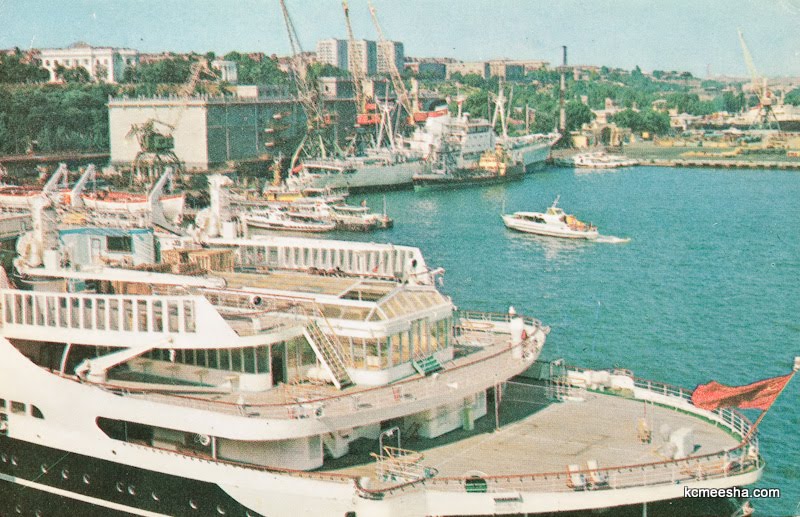Tsoi Lives
20 years ago today a popular Russian rock singer Victor Tsoi died in a car accident.
20 years ago his songs spoke to us.
20 years ago we raised our arms and yelled “We Are Waiting for Changes” together with him.
20 years ago his songs sounded like a war cry.
20 years later it’s still the most played CD that I own.
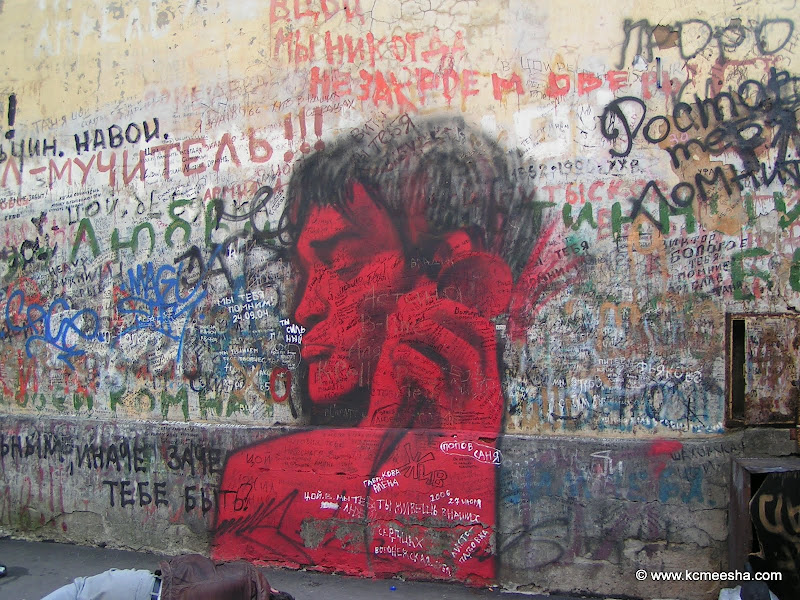
Tsoi Wall in Moscow httpvh://www.youtube.com/watch?v=DB0ErvJfT7Q
We want changes!
It’s the demand of our hearts.
We want changes!
It’s the demand of our eyes.
In our laughter, in our tears, and the pulse in our veins.
We want changes!httpvh://www.youtube.com/watch?v=3m5peDpAFVs
httpvh://www.youtube.com/watch?v=B7gPKBOGPAE
Continue reading →Rear End Sightings
“Straight Talk Express” has left the city.
His name is not “The man upstairs”, his name is Jesus
Continue reading →Real World War II (Part 3)
It would be nice if the colonel tried to think about and prepare an attack, to check whether everything possible is done, but oftentimes he was simply mediocre, lazy, drunk. Often he did not want to leave the warm shelter and crawl under the bullets … Often an artillery officer didn’t completely identify the targets and, afraid to take risks, shot from a distance covering an entire area, frequently shelling our own troops … Sometimes a supplier was having fun drinking and entertaining the women in the nearest village, forgetting to deliver shells and food … Or a Major would get lost using a compass and lead his battalion into a completely different area. Confusion, mistakes, deficiencies, fraud, failure to fulfill one’s duty, so typical of us in the civilian life, is more evident during the war. And for all these the price is the same – blood. Ivan’s attack and die, but their commanders sitting in the shelter keep sending them into attack again and again. It’s surprising how different the human psychology is for those who have to attack and those who observe; when you don’t have to die yourself everything seems simple – just keep moving forward!
One night, I substituted for a telephone operator at the apparatus. Communications were primitive then and calls on all lines could be heard at all points, I learned how commander Fedyuninsky talks with divisional commanders: “Your mother! Forward! If there is no advance – I will personally shoot you! Your mother! Attack! Your mother! » (Russian swearing)… Two years ago elderly Ivan Ivanovich (*Fedyuninsky), now a kindly grandfather, was telling the kids about the war on TV in completely different terms.
In a language of parable, the following occurred: the house got infested with bugs and the owner ordered the residents to burn the house down and burn themselves along with the bugs. Someone will be left to rebuild it all … We didn’t know any better and couldn’t do it otherwise. I read somewhere that the British intelligence service is preparing its agents for decades. They are taught in the best colleges; trained athletically, intellectually and become well-rounded professionals in their business. Then these agents go on to solve the world’s problems. In Asian countries, the task is given a thousand or ten thousand hastily coached people in the hope that even if almost all fail and are destroyed, at least one will accomplish his mission. They have neither the time nor the means to prepare and lack experienced instructors. Everything is done in a hurry – not enough time, not enough planning, or if there was an effort it turned out to be misguided. Everything is done reflexively, by intuition, by sheer numbers. That’s how we fought. In 1942, there was no alternative. A Wise Master in the Kremlin knew it all too well and kept pressing his iron will, ordering the only thing he could: “Attack!” And we attacked and attacked and attacked … And the mountain of corpses at the Pohost, and many other areas and nameless heights grew, grew, and grew. That’s how the Victory was hammered out.
If the Germans had managed to infiltrate our command staffs with spies, and the troops with saboteurs, if there was mass treason and enemies would develop a detailed plan to collapse our army, they would not have achieved the effect which was the result of the idiocy, stupidity and irresponsibility of the authorities and helpless submission of our soldiers. I saw this near Pohost, and as it turned out, it was like this everywhere.
The war has exposed the underside of the Bolshevik regime. Just like during the peacetime when they conducted detentions and executions of the most hardworking, honest, intelligent, active and bright people, they continued to do it on the frontlines, but in a more open and revolting form. Here is an example. From the high command came and order: take over a heights. The regiment stormed it week after week, losing a lot of people every day. Replacements were moved in constantly, there was no shortage of people. But among them were swollen from hunger residents of Leningrad, who were prescribed bed regime and high-calorie diet for three weeks by the medics. Among them are youngsters born in 1926 who fourteen and not eligible for the military draft … “Forrrward!!! “and nothing else. At last, a soldier or a lieutenant, a platoon leader, or captain, commander of the company (rarely), seeing a crying shame, exclaims: “You can’t sacrifice the people like this!. There, on top of the height, there is a concrete reinforced firing point! And we have only 76-millimeter tiny gun! It cannot pierce the concrete! “… Political officers and SMERSH immediately get involved, a tribunal is set up. One of the informers, who are plentiful everywhere, testifies: “Yes, in the presence of the soldiers he questioned our victory.” Immediately a pre-printed form gets filled out, where they only need to enter the name and the resolution: “Execute!” or “Send to the penal company!” which was pretty much the same. That’s how the most honest and responsible people got eliminated. And the rest – “Forrrward ! Attack!” There are no fortresses that could withstand the Bolsheviks! “And the Germans dug into the dirt, creating a maze of trenches and shelters. Go get them! Stupid, senseless killing of our soldiers went on. Presumably, this selection of the Russian people – is a ticking time bomb: it will explode after a few generations, XXI or XXII century, when selected and nourished by the Bolsheviks mass of scum will create new generations of their kind.
It is easy to write it, when the years have passed, when the crater near Pohost got filled up; when almost everyone had forgotten that little station; when anguish and despair are not as painful as it was then. Imagining such despair is not possible, only a person who himself had experienced the necessity to stand up and run towards death can understand it. Not someone else but namely you, and not someday, but right now, this minute, you must go into the fire, where, at best, you can get lightly hurt, and at worst – either tear up the jaw, or the stomach, or he knock out the eyes, or shred the skull. That’s you, although you want to live so badly! You, who had so much hope! You, who had not yet lived, and hadn’t seen anything in life! You, who still has the whole life ahead! You, who is only seventeen! You must be willing to die, not only now but always. Today you are lucky, death passed you by. But tomorrow there will be another attack and again you have to be ready to die, and not heroically, but without celebration, without the orchestra and speeches, in the mud, in the stench. And no one will notice your death: you will lie down in a big pile of corpses near the railroad and rot, forgotten by all, in the sticky mire of the marshes near Pohost.
Poor, poor Russian peasants! They got caught between the millstones in the mill of history between the two genocides. On the one hand they were being destroyed by Stalin, herding them with the gunfire into socialism, and now, in 1941-1945, Hitler was killing myriads of innocent people. That’s how the victory was being forged, that’s how the Russian nation was being destroyed, especially its soul. How will live the descendants of those who survived? And what will happen to Russia?
So why were they marching to the death, with a clear understanding of its inevitability? Why did they go, against their wishes? They marched not just with the fear of death, they were completely terror-stricken, and yet they marched! They didn’t have to think and justify their actions. They were too preoccupied. They just got up and walked, because they HAD to! They listened politely to the parting words of their political officers – illiterate retelling of the worthless newspaper editorials – and kept going. They were not inspired by some ideas or slogans, they just had to. That’s probably how our ancestors went to die on Kulikovo Field or at Borodino (major battles in the Russian history). It is unlikely that they speculated about the historical perspectives and the greatness of our nation … Upon reaching the neutral zone, they weren’t shouting “For the Motherland! For Stalin! “, as they write in the novels. In the line of fire one could hear the hoarse howling and thick foul language, until the bullets and shell fragments didn’t shut the screaming throats up. No one cared about Stalin when the death was near. So why now in the sixties, again arose the myth that we have won only because of Stalin, under the banner of Stalin? I have no doubt on this matter. Those who won, had either fallen on the battlefield, became alcoholics depressed by the post-war hardships. They had to bear not only the war, but also all of the post-war reconstruction of the country. Those of them who are still alive are now silent, broken. The people in power now are the ones who avoided the carnage – those who sent people to the camps, those who ordered the senseless attacks in the bloody war. They acted in the name of Stalin, and they are still crying about it. There wasn’t “For Stalin!” on the frontline. The Commissars have tried to hammer it into our heads, but the commissars did not go under bullets. I just had to vent…

1942.Top: Destroyed Soviet Tank. Bottom: Graves of the crew of a downed German Plane Sunset Over A Sea Of Corn
“Sunset Over A Sea of Corn” would have been a title of a picture I should’ve taken but waited just long enough for the sun to finally dissolve in the eight-feet-tall waves of corn somewhere between Bowling Green and Laddonia.
Maybe I am compensating for not having a car for the first 23 years of my life and never taking a real road-trip until I was a grown man but I’ve been doing a double-duty putting some miles on my car driving around these here United States. It also helps me maintain a healthy-sized carbon footprint, adding my little share to the global warming and destroying the environment. Luckily my daughter doesn’t mind hours of driving as long as I don’t sing in the car, which is hard because the seemingly omnipresent country station is pumping out things like:
You should hear this stuff with the Russian accent, it will really “turn you on”.
Over the past weekend we added another 1,200 miles to my car’s odometer, going to Chicago and back. This time we took a different route cutting through the South-Central-Eastern Missouri and Central-Western Illinois in order to make a stop at Springfield,IL to check up on the Land Of Lincoln. Driving on the rural highways has a more intimate feel since you actually have to slow down in each little town on the way, you get to see people’s houses, rusted farm equipment, smell the manure, and pass a tractor or two on the way. Somewhere between the anti-abortion billboards, entertained by a single country radio station, another breed of American people goes on about their lives unconcerned by their standing in the social media.
We took our time driving through this area and if I actually stopped and took every photo I wanted to, we’d still be on the road. So here are a few I actually had a chance to take.
The General Store in Atlas,IL has this sign that is the most concise restaurant review I’ve ever seen: “Eat Here – Get Worms”.
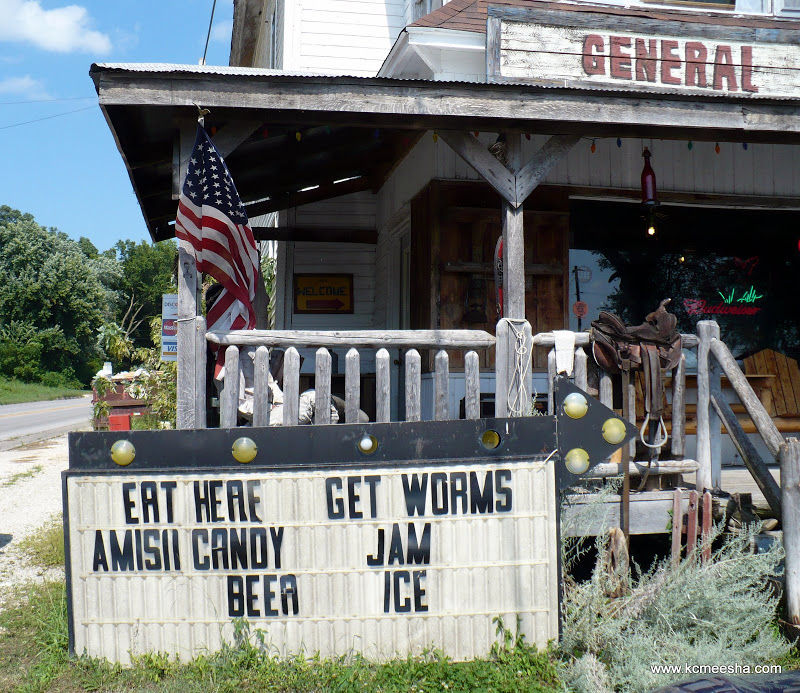
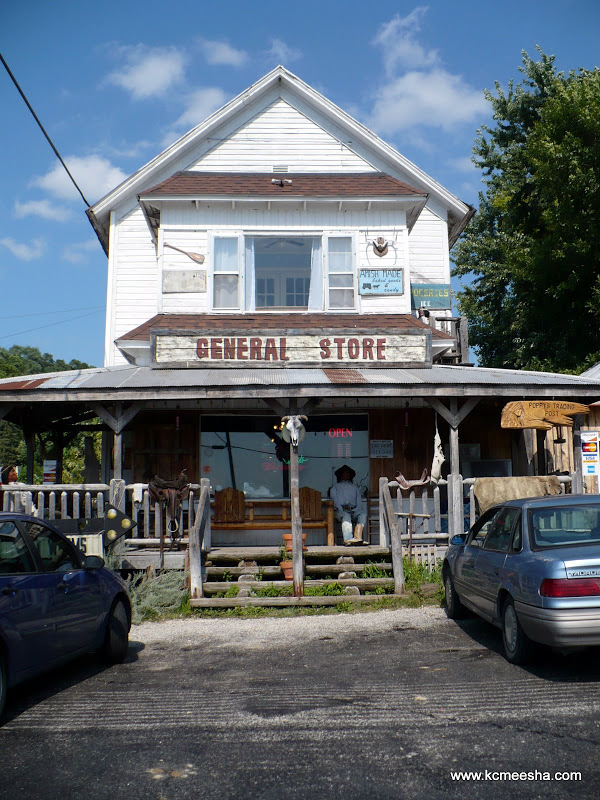
Pike County Courthouse in Pittsfield,IL
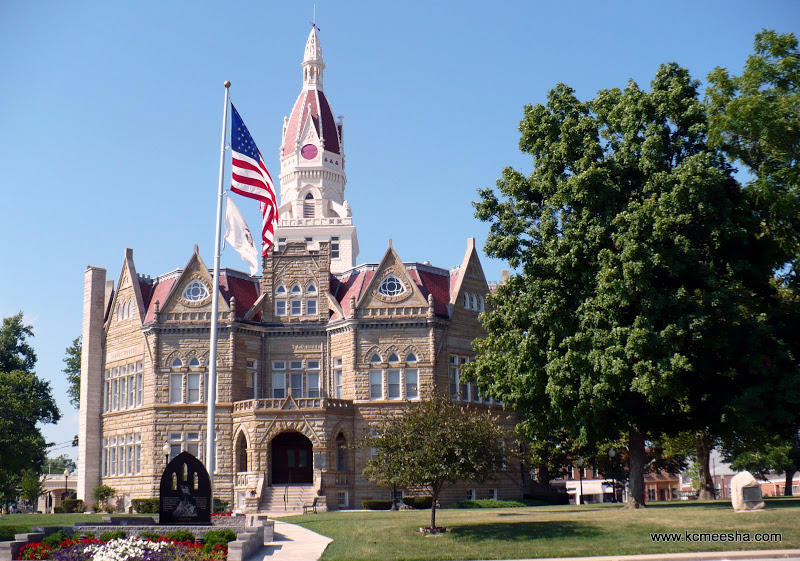
Lincoln’s Home in Springfield, IL.
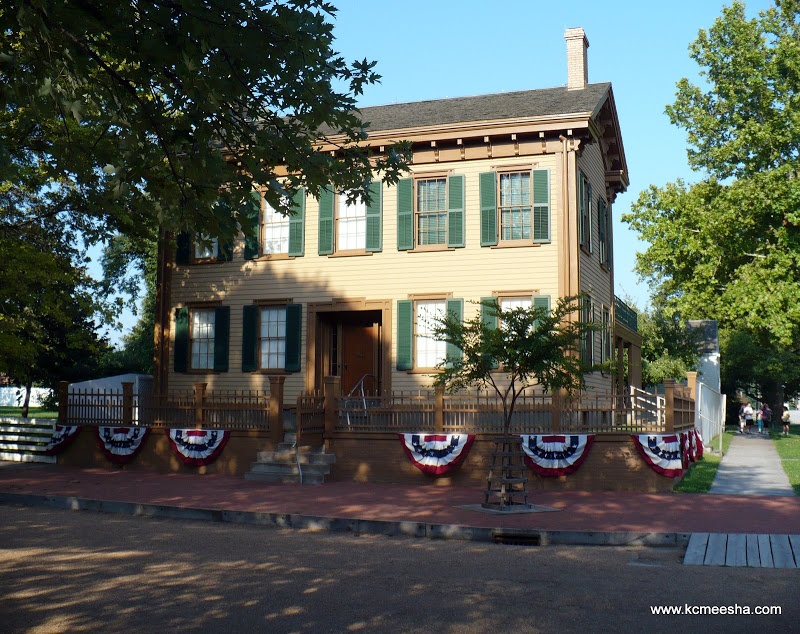
Lincoln’s Home is just a part of a larger historic site which preserved Springfield as Lincoln would’ve experienced it, sans tourist crowds. In front of his home Lincoln Troubadours perform the period songs.httpv://www.youtube.com/watch?v=RvshZW_Zfik

Next the Illinois State Capitol (compare to the Kansas State Capitol):
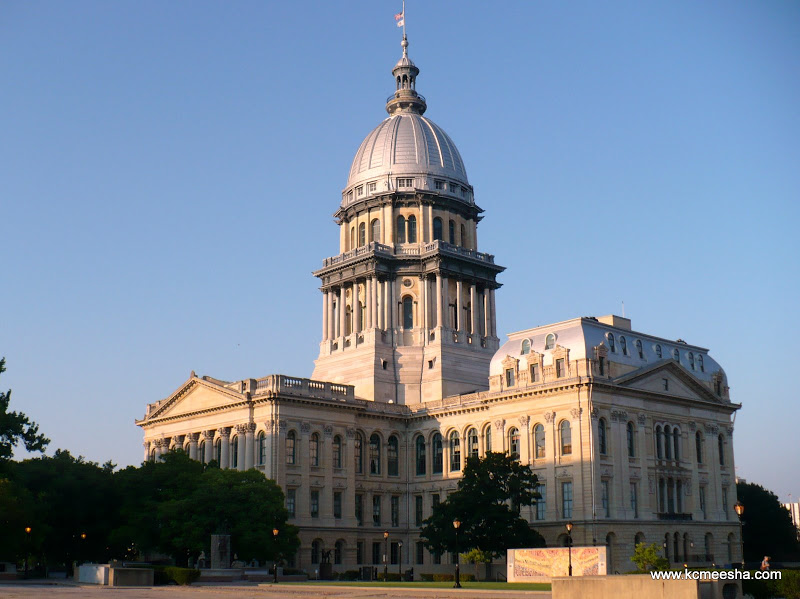
Chicago always has the neatest-looking sculptures. This one looks like alphabet soup on acid:
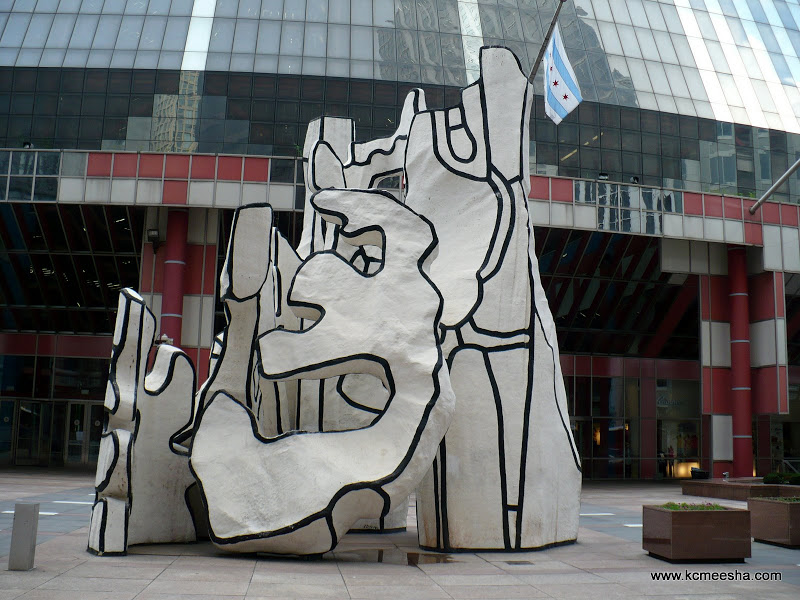
Chimpotle’s likeness scares customers away near some local bar:
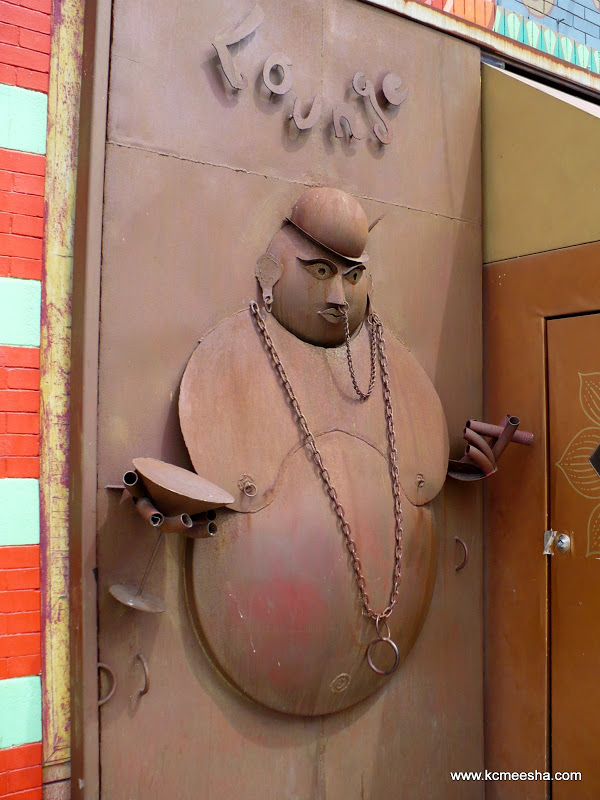
Obligatory skyline shot:
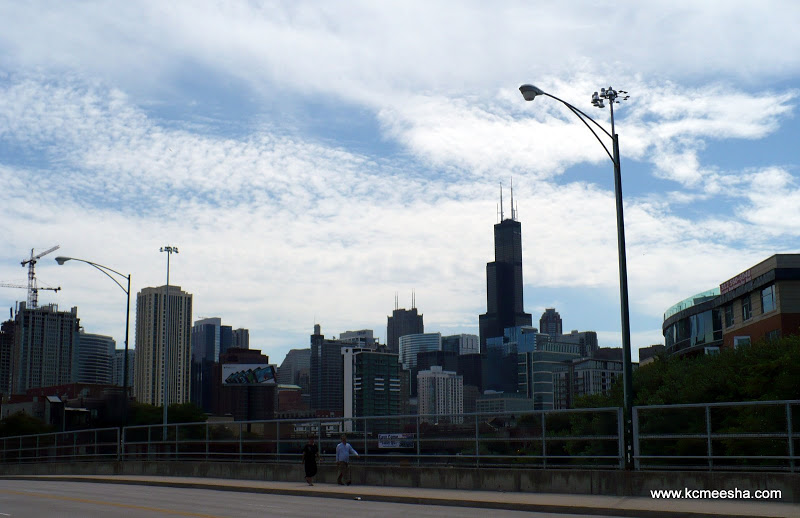
I guess you can find peace and quiet even at the busiest corner in the middle of the busy city:
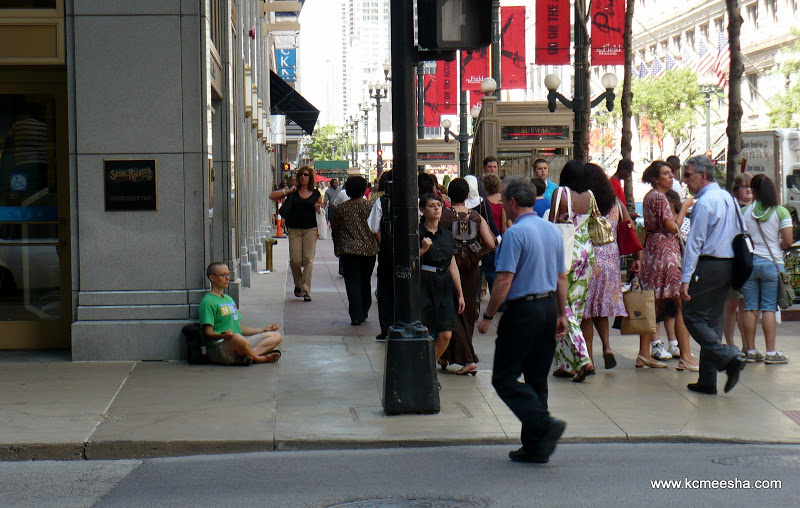
This could be Chicago’s mayor and his wife, or KC’s mayor and his wife (after skipping a dinner or two).
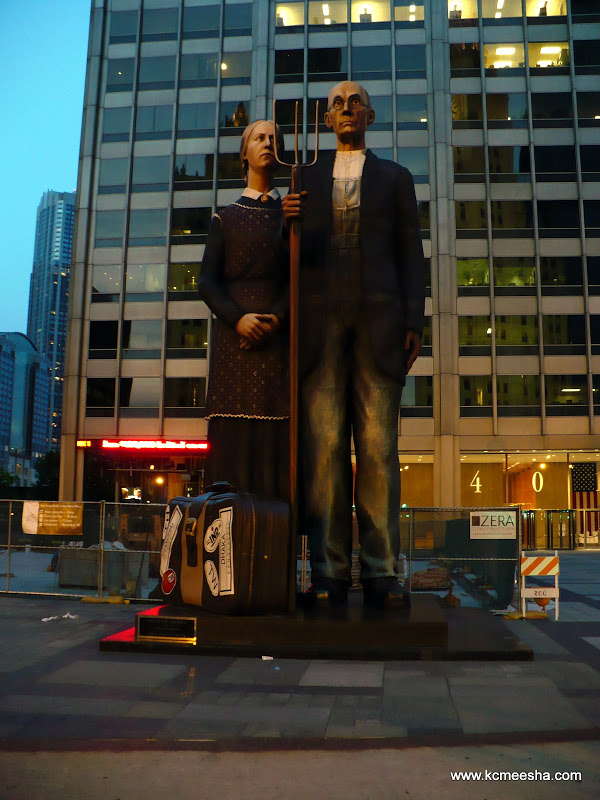
Lincoln’s body is still there, tourists disappointed by the lack of a souvenir shop wandering around the cemetery.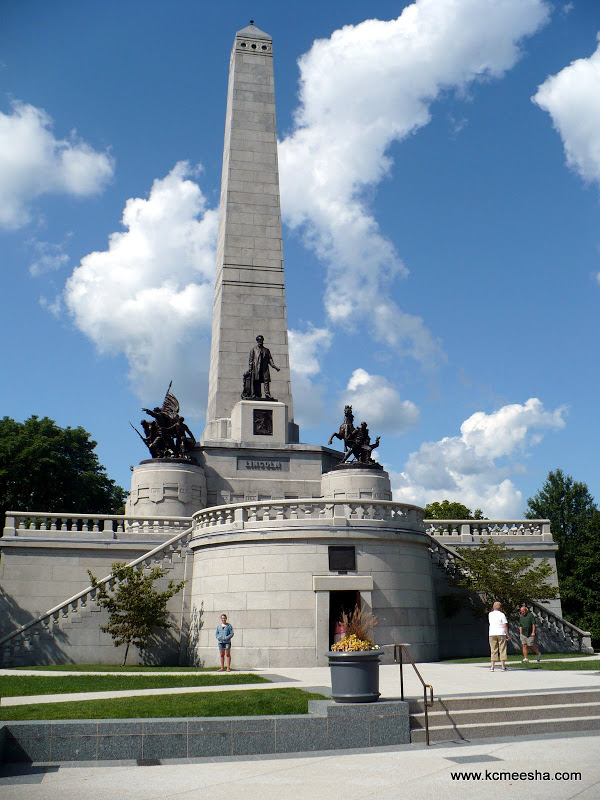
View of the Mississippi from Louisiana, MO.
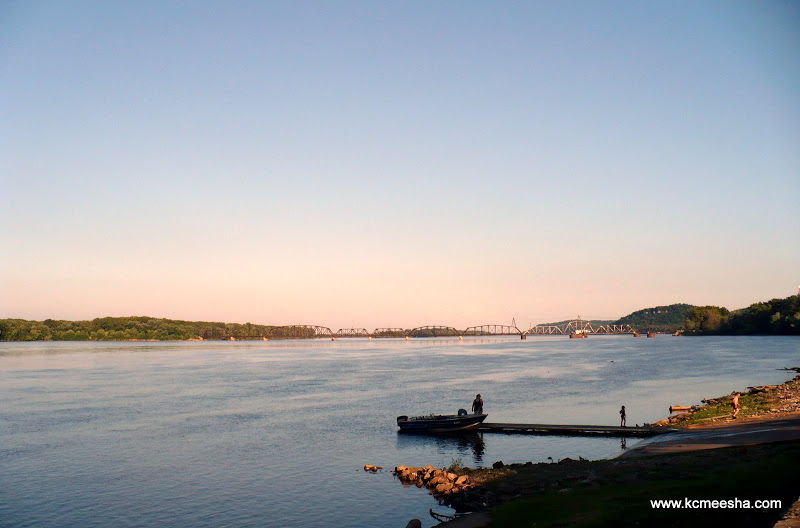
Louisiana turned out to be a very nice small town with several streets lined with Victorian mansions overlooking the river. Some in better condition than others.
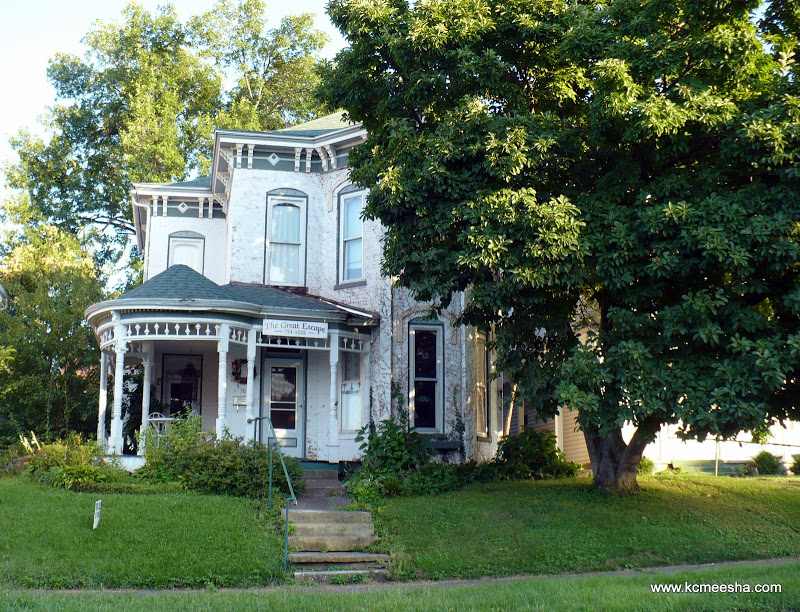
Health-care debate goes on here as well.
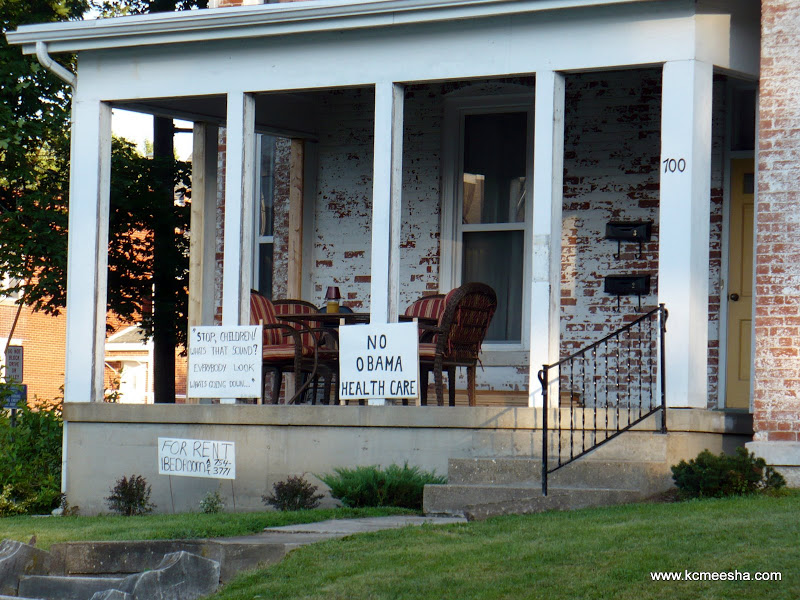
Continue reading →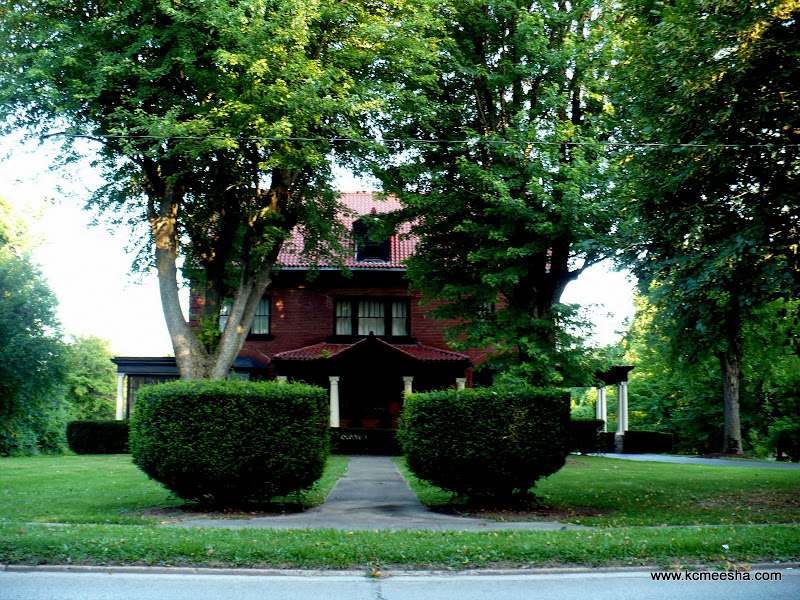
After watching the sunset we finally got back on I70 and the countryside disappeared in an unending strobe-lights of trucks and road construction cones. We were almost home.Old Photos: Nostalgia
Nineteen years ago today an otherwise routine TWA flight landed in the Kansas City International Airport with me, my family and all of our possessions on board. We walked out into a 70F day wearing winter jackets and fur hats to start our lives in this country with a few hundred dollars and our broken English.
To mark this date I will answer the question I’ve been asked the most during these years –
How do you say “fuck” in Russian?What part of Russia is Ukraine?Do you miss the old country?Do I miss the old country? The short answer is no. I really don’t. I don’t long for the streets and the beaches; don’t miss the sound of a familiar language; don’t care to mingle with the people; don’t feel like I belong there.
There is a long answer though, to a slightly different question: do I miss the old country between 1969 and 1992? Yes, I do.
I had plenty of time to think about nostalgia and even test it out by going back several times. I think that places don’t mean much without the memories. Memories is the difference between the place that means something in one’s life and just another tourist attraction. You walk down the streets and remember a place where you first walked next to a girl; or a spot where you stood on your first day of school with a giant bouquet of flowers; a storefront that used to sell the best ice cream in the city; a toy store where you wandered in without any money; a street where you got punched in the nose (and still have a crooked nose as a reminder); a park you used to go to with your parents; a place where you learned to ride a bike; a building where you first love used to live; a street where you walked wearing a gas mask to win a bet; many other things, probably not that important in the big picture but still somehow stored in your head all these years. These things I miss, but they are no longer there, they were just a brief moments of my life and there is no way to go back and relive them. Maybe it’s better that way; that’s what makes these memories unique and a huge part of who I am.
I don’t have to go back to a specific place to reminisce. The place since moved on anyway – rebuilt, reinvented, repainted, renamed, refurbished, re-branded, repopulated, recycled and replaced. I no longer feel like I am a part of it. I feel like I am going back to the old country when I talk with my childhood friend in Argentina, or call my old neighbor in Boston, or catch up with my army buddy in New York. Old country is us. Old country is our memories. Old country is these photographs. Fuzzy and oddly vivid, just like I remember.
Continue reading →